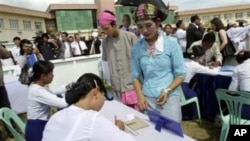Burma has barred foreign observers and journalists from the country's controversial elections. The restriction is the latest in a series of moves that critics say guarantees Burma's first elections in 20 years will favor the military government.
At a briefing in Burma's remote capital, Naypyidaw, the Election Commission told journalists and diplomats already in the country their presence would be adequate for the elections.
Burma's neighbors in the Association of Southeast Asian Nations offered to observe the elections, but the government turned them down.
There are about 25 foreign news organizations registered in Burma, most are staffed by Burmese citizens.
The commission says diplomats and foreign organizations in Burma will be taken on a tour during the elections. Therefore, he said, no invitations will be given to election observers or foreign media.
Vincent Brossel is with the media freedom organization Reporters Without Borders in Paris. He says this latest restriction shows the government has no intention of holding free and fair elections.
"One of the condition[s] for a democratic election is again refused by the government," said Brossel. "They have all control on the Burmese media and now that the foreign journalists are denied to access [to] Burma during the election[s] that gives no chances to get transparency and accountability."
Scores of foreign news organizations are expected to try to cover the elections, but now will be forced to do so from outside the country. VOA is among them.
Burma's military government has billed the November 7th elections, the first in two decades, as part of its road map to democracy after 50 years of military rule.
But critics say the military is merely cementing its grip on power in the guise of elections.
The military is guaranteed a quarter of all parliament seats, regardless of votes.
The government also refuses to allow millions of ethnic minorities a vote in parts of the country where militias have fought for independence.
Thailand's Defense Ministry says it is beefing up security along the border with Burma. There are concerns the Burmese military will crack down on ethnic minorities or on dissidents, causing an inflow of refugees.
Strict election laws forced the largest opposition party, led by Aung San Suu Kyi, to be dissolved. The National League for Democracy won Burma's last elections in 1990, but the military ignored the results and has kept her locked up for most of the time since.















